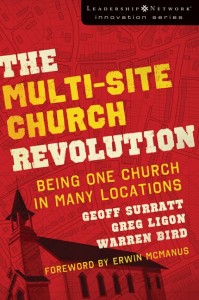Mulling Motivations for Multiple Ministry Sites
Multi-campus churches seem to be the hot thing right now among exploding churches, and among churches that want to be exploding. I have no criticism about the strategic value of this practice—I’m sure it makes sense for some, and out of necessity we even embraced a second location during the school year—but something I read in the Bible the other day addressed the motivation for expanding ministry this way.
In 1 Kings 12 and 2 Chronicles 11 we read about a tale of two kings. Rehoboam was the son of Solomon and leader of the Southern Kingdom Judah, and Jeroboam was the newly installed monarch of the newly formed Northern Kingdom of Israel. Though each of them seems to be paying a pretty steep stupid tax (and I would suggest neither as any kind of model for leadership), they also both set up multiple “ministry venues”, but for radically different reasons. And I want to be clear—I’m considering the motivation here, not the model.
Jeroboam created two worship sites because he was worried about losing people. While there is an obvious serious problem with his idol-centered-theology, there is something else going on here: Multiple venues were all about keeping people in his kingdom.
Rehoboam installed commanders in various towns to distribute resources and protection among the people for whom he was responsible. Multiple venues were all about serving (ministering to) people who chose to be in his kingdom, and about providing a place for the next generation to exercise leadership.
Ministry strategies are as varied as the sand on the beach. But with every new tactic employed, we must ask, and honestly answer, “why we are doing what we do?” If we create new venues to simply extend our own ministry reach or build the kingdom of our church, we should repent.
On the other hand, if we multiply campuses so that we can serve our people better and develop the next generations of leaders who will be ready to pastor God’s people, we may be tapping into something positive.
Here is a great way to answer the motivation question: Are we ready to release our campuses to be full-fledged congregations as soon as the Lord impresses us to do so? Or, does our soul struggle with the thought because of all the money and energy and leadership that have been given to the endeavor?
One of my heroes, Ralph More, recently wrote “Healthy movements don’t own their church plants, they accept them as peers.” So, do we intend for a campus to “grow up” and become a self-sustaining autonomous congregation, or do we act like dysfunctional parents who make sure their kids always need them, not recognizing that healthy independence and intentional separation may be the best way to support generational Kingdom extension?
These are just some random things I’m thinking about this Monday morning. I honestly haven’t read a ton about multi-site, so this isn’t a critique of the practice, but just a challenge for the motivation. Maybe you can help support, correct, or refine my thoughts?

